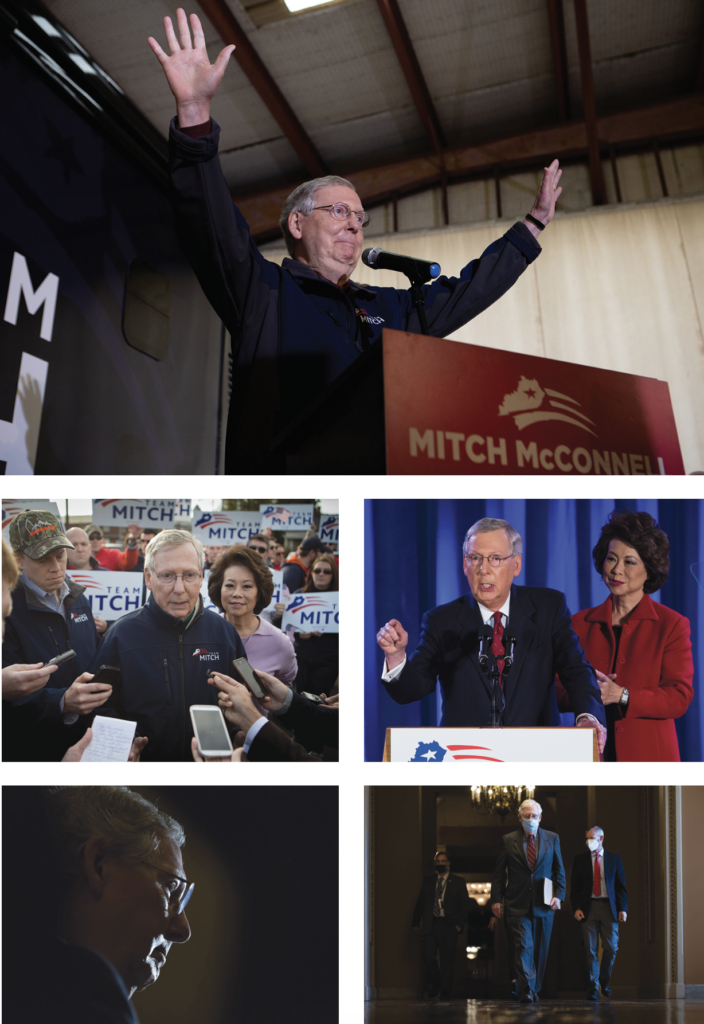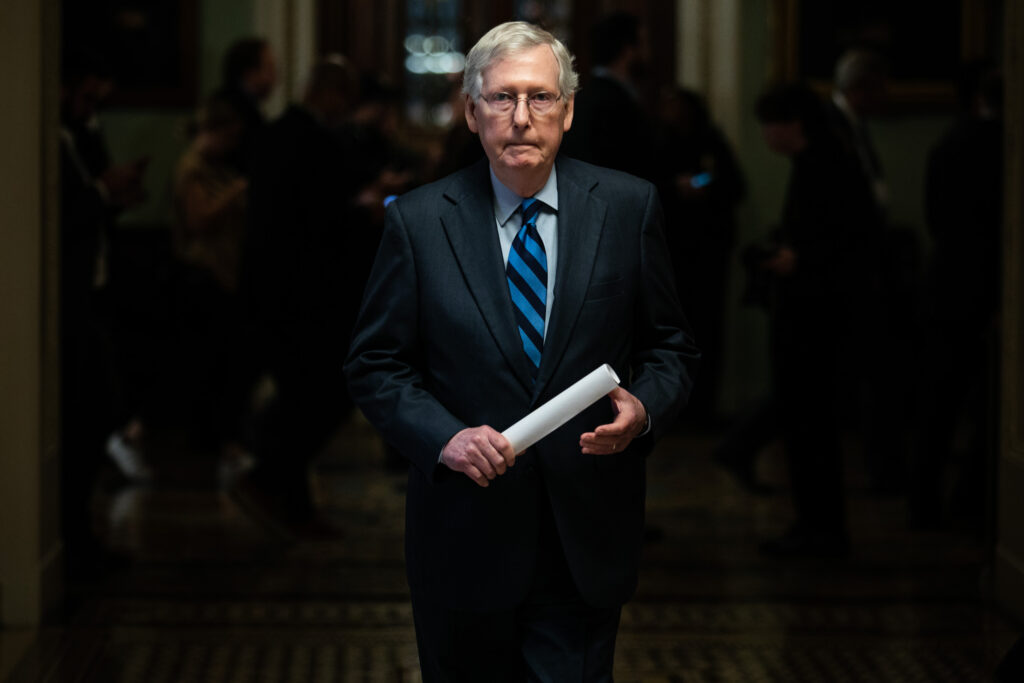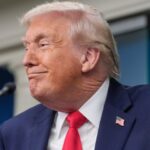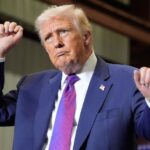
Perhaps this town was no longer big enough for the both of them.
With former President Donald Trump on the cusp of clinching the 2024 Republican nomination, Senate Minority Leader Mitch McConnell (R-KY) announced he was stepping down from his post before the end of the year.
“One of life’s most underappreciated talents is to know when it’s time to move on to life’s next chapter,” McConnell said after indicating this will be his “last term as Republican leader in the Senate.”
No one has ever held the leadership position longer. McConnell was first elected to the Senate when Ronald Reagan was president and plans to serve out his current term, which expires in January 2027. He became Republican leader after the 2006 elections and won nine consecutive elections for the job, most recently beating out Sen. Rick Scott (R-FL) in November 2022.
A skilled legislative tactician and canny political operator, McConnell has non-Trump-related reasons to call it quits in November after leading the Senate GOP for 18 years. The Kentucky Republican had a health scare last year, freezing multiple times while talking to reporters and injuring himself in a fall.
McConnell returned to the Capitol with a clean bill of health, but as he recovered from his concussion and rib injury, there were reports of other similar incidents over the past year. He had fractured a shoulder after falling in 2019. “I’m very happy to be back,” McConnell said. “There’s important business for Congress to tackle.” He then deadpanned, “Suffice it to say, this wasn’t the first time that being hardheaded has served me very well.”

The seven-term senator also recently turned 82. There have been bipartisan calls for a new generation of political leaders. House Democrats replaced most of their octogenarian leadership team during this Congress, with the last of them, Rep. Jim Clyburn (D-SC), set to step down next year. Like former House Speaker Nancy Pelosi (D-CA), he will remain in Congress.
President Joe Biden is seeking reelection amid widespread concerns about his age and mental acuity. He will turn 82 shortly after the election. Former U.S. Ambassador to the United Nations Nikki Haley, who has called for mental competency testing for politicians aged 75 and up, has made an issue of Trump’s age during her GOP primary campaign. The former president will turn 78 in June.
McConnell heeded this sentiment when explaining his decision to surrender the leadership position in a Senate floor speech. “Father Time remains undefeated. I am no longer the young man sitting in the back, hoping colleagues would remember my name,” he said. “It is time for the next generation of leadership.”
But a generational and ideological shift inside the Republican Party, long evident in the House and increasingly on display in the Senate, may have also prompted the change. Sens. Mike Lee (R-UT), Rand Paul (R-KY), Josh Hawley (R-MO), Ted Cruz (R-TX), J.D. Vance (R-OH), and, in recent years, Marco Rubio (R-FL) are among those who favor a more adversarial approach in dealing with Democrats.
Some of them also have adopted a more populist stance on trade, immigration, foreign policy, and the role of free markets than prevailed in McConnell’s Reagan-era GOP. Others are more libertarian or incorporate elements of both strains.
“There’s absolutely a change in the Republican conference,” Cruz told the Washington Examiner last year. “It is getting younger. It is getting, I hope, more conservative. It is getting more responsive to the voters.”
The Texas Republican added, “For a long time, Washington has been out of touch with the voters. I think that was one of the major causes of Donald Trump being elected … the voters were furious with career politicians in Washington and both parties who weren’t listening to them.”

Trump has accelerated many of these trends. In addition to their political and strategic disagreements — Trump has called for junking the filibuster when Republicans control the Senate, McConnell has fought for its preservation — the two men had a personal falling out in the aftermath of the 2020 election and the Jan. 6 Capitol riot.
The former president has made incendiary comments on social media about McConnell’s wife, Elaine Chao, who served in his Cabinet. Trump has accused the McConnell family of business ties to China. Chao was born in Taiwan and has lived in the United States since she was 8 years old.
Some of Trump’s biggest accomplishments came when he and McConnell worked together. This includes the Trump tax cuts and a transformation of the federal judiciary, including the current 6-3 Republican-appointed majority on the Supreme Court.
“We wouldn’t have had the Dobbs decision [overturning Roe v. Wade] without those three justices he managed to get through with Mitch McConnell as the majority leader in the Senate he continues to demean,” veteran conservative columnist Cal Thomas, author of A Watchman in the Night, told the Washington Examiner last year.
Those efforts predated Trump. After his Democratic counterpart Harry Reid detonated the “nuclear option” to facilitate the confirmation of then-President Barack Obama’s lower court nominees in 2013, McConnell not too subtly warned him Democrats would regret it.
After the death of Justice Antonin Scalia, a conservative icon, McConnell held up Obama’s nomination of Merrick Garland for nearly a year. McConnell then went nuclear for Supreme Court nominees to allow Trump to fill the seat with Justice Neil Gorsuch. None of Trump’s three high court picks would have cleared a Senate filibuster. This includes Justice Amy Coney Barrett, who replaced the late Justice Ruth Bader Ginsburg. Ginsburg enjoyed a similar status to Scalia but on the Left.
McConnell guided Trump through his first Senate impeachment trial. “And Mitch, he stayed there right from the beginning, he never changed,” Trump said at a post-acquittal White House celebration. “And Mitch McConnell, I want to tell you, you did a fantastic job.”

McConnell’s decision not to hold a Senate trial during Trump’s second impeachment while he was in office made that acquittal more likely, easing the former president’s path to another campaign in 2024.
“There is no question former President Trump bears moral responsibility” for Jan. 6, McConnell wrote in a Wall Street Journal op-ed explaining his reasoning. “His supporters stormed the Capitol because of the unhinged falsehoods he shouted into the world’s largest megaphone.” But he added that there was no reason to follow “a rushed House process with a light-speed Senate sham” in what he described as a “footrace to outrun our loss of jurisdiction” once Trump left office.
Trump could return to the White House in January, which would have made it difficult for McConnell to continue as Senate Republican leader. If Trump wins in November, this might pave the way for McConnell to play a role more similar to that of retiring Sen. Mitt Romney (R-UT).
McConnell’s relationship with the sitting Democratic president has already led to frequent clashes with House and Senate Republicans. McConnell voted with Biden on infrastructure and his semiconductors bill. Some Republicans on Capitol Hill felt McConnell got outmaneuvered by Senate Majority Leader Chuck Schumer (D-NY) on the Inflation Reduction Act, the second Democrats-only reconciliation bill of Biden’s presidency.
The Kentucky Republican recently left House Speaker Mike Johnson (R-LA) alone to defend his conference’s position on Ukraine aid at a White House meeting. McConnell is a leading supporter of the Ukraine funds.
But the biggest split may have been over immigration, the matter that most often sets the GOP governing class against its base and led most directly to the rise of Trump. House Republicans raged at McConnell as the Senate floated a bipartisan border deal Republicans pronounced dead on arrival.
Immigration has emerged in exit polls as the top issue in this year’s GOP primaries, and the border has been one of the biggest drags on Biden throughout his term. Trump urged congressional Republicans to reject a border deal.
McConnell is arguably the most conservative Senate Republican leader since Robert Taft. Yet he frequently clashed with the grassroots conservatives over initiatives like the above and primaries as he sought to promote Senate candidates he believed were most electable. McConnell also served during a time when the definition of conservatism was evolving and when the Republican electoral coalition was becoming more blue-collar.
This drove down McConnell’s approval ratings across the board and created a Republican leadership vacuum that Trump eventually filled. However, there remain doubts about whether McConnell’s would-be successors can govern more effectively or achieve electoral victories comparable to Reagan’s 49-state landslide in 1984, the year McConnell was first elected to the Senate.
CLICK HERE TO READ MORE FROM THE WASHINGTON EXAMINER
“Somebody said, ‘You know, Mitch is quiet,’” Trump said of McConnell during happier times between the two. “And I said, ‘He’s not quiet. … He doesn’t want people to know him.’”
McConnell sounded a similar note himself. “I still have enough gas in the tank to thoroughly disappoint my critics, and I intend to do so with all the enthusiasm which they have become accustomed,” he quipped.
W. James Antle III is executive editor of the Washington Examiner magazine.





